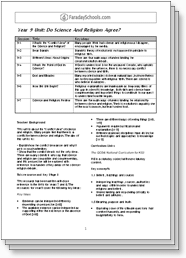RE KS3 Y8 Teachers Guides
Teacher Background
This unit examines reasons to believe something is true.
How do pupils perceive the concept of truth? Are there different ways of seeing truth?
How are different kinds of truths supported?
In this unit, the aim is to highlight that science and religion are in the main, addressing different questions. The scientific way of gathering evidence to support ideas cannot be applied to the types of questions that are seen as significant in religious thinking.
This resource and Key Stage 3
This resource offers a learning journey to take pupils from Year 7 to 9. The resources for Year 7 and Year 8 are closely linked and address the following:
Key Ideas
- Scientific ideas are supported by observations. The observations must be repeatable. (Yr7 and Yr8)
- Religion makes claims that cannot be tested or supported scientifically. (Yr8)
- Science only addresses questions that relate to the natural world and how it works. Many religious people say it is wrong to try to answer scientific questions using religious texts. (Yr8)
- Some people interpret their experiences as supporting an argument for the existence of God while others interpret their experiences as supporting the argument that God does not exist. (Yr8)
Curriculum Links
The QCDA National Curriculum for KS3
RE is a statutory subject with non-statutory content.
Key concepts
1.1 Beliefs, teachings and sources
Interpreting teachings, sources, authorities and ways of life in order to understand religions and beliefs.
Understanding and responding critically to beliefs and attitudes.
1.5 Meaning, purpose and truth
Exploring some of the ultimate questions that confront humanity, and responding imaginatively to them.
1.6 Values and commitments
Evaluating their own and others values in order to make informed, rational and imaginative choices.
Range and content
- beliefs and concepts; the key ideas and questions of meaning in religion and beliefs, including issues related to God, truth, the world, human life, and life after death
Exploring some of the ultimate questions that confront humanity, and responding imaginatively to them.
